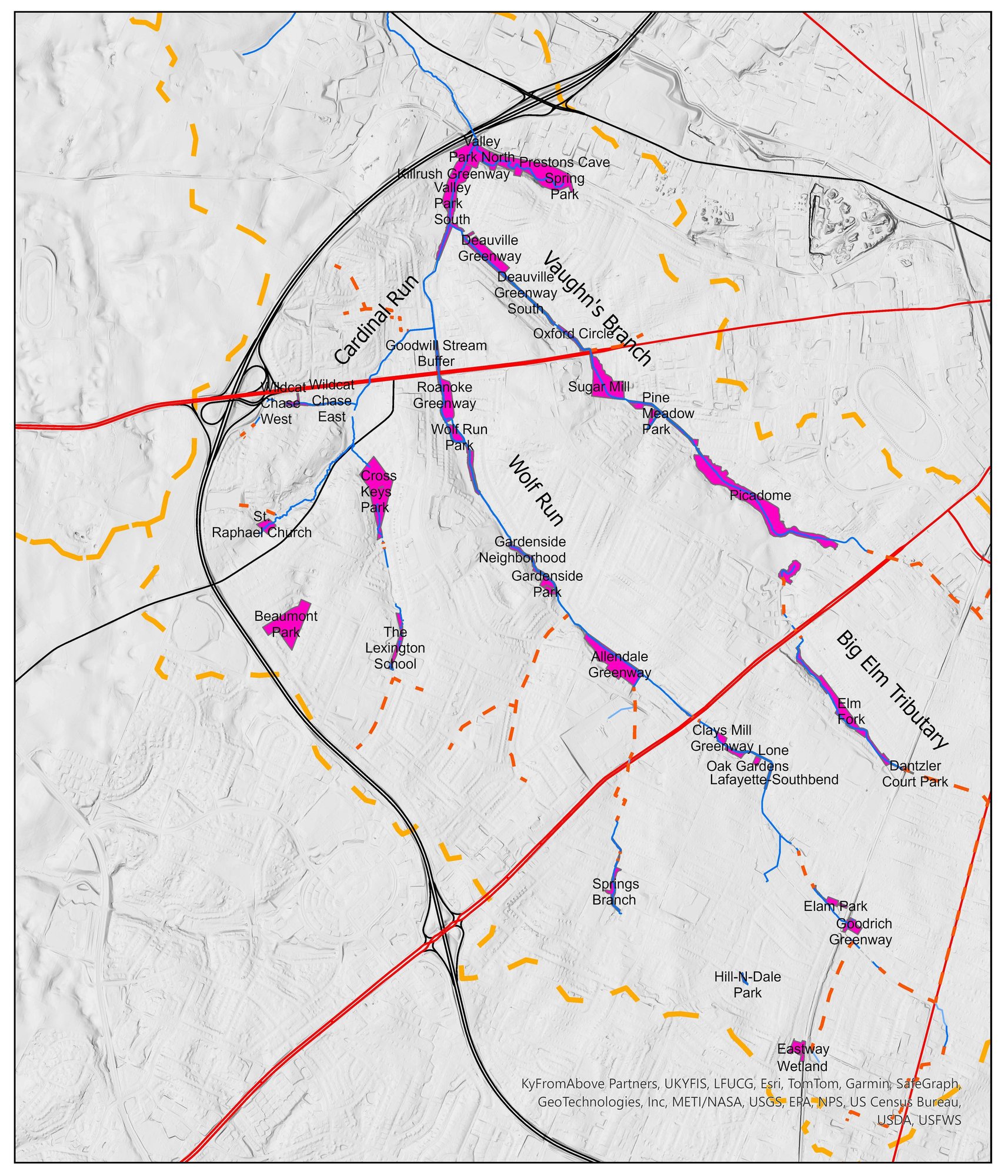The Big Picture
Here’s an overview of the opportunities we’re exploring for the greenspace.
- Home >
- Goals
The long term, big picture goals for the Bob O Link Greenspace include creating a conservation greenway plan.
A conservation greenway is a thoughtfully planned corridor of protected land that connects natural areas while supporting both ecological health and community well-being.
4 Key Features of a Conservation Greenway
🍃Core Purpose
Preserve natural habitats
Restoring native vegetation supports pollinators, birds, and aquatic food webs.
Safeguard and restore natural habitats for future generations by maintaining undeveloped areas where native plants and animals can flourish.
GOALS: Replacement of low-value invasive shrubs with native species that provide:
higher-quality forage, improved insect diversity, better nesting and cover conditions
WISH LIST ACTIVITIES:
- native planting
- bird and bat boxes
Support / Increase biodiversity
Protecting the land today reduces costs and risks tomorrow.
Foster a rich variety of plants and animals by creating connected habitats that support wildlife health and resilience. Conservation greenways help sustain pollinators, preserve rare species, and encourage the natural movement and diversity of life across our landscapes.
WISH LIST ACTIVITIES: native plantings, native meadows, pollinator garden
- milkweed, coneflower, blazing star, zinnias, sunflowers
- bird and bat boxes: owl, bluebird (also used by chickadees, wrens, titmice, swallows)
Improve water quality
Our work enhances riparian buffers to protect soil, water, and related natural resources.
Conservation greenways play a vital role in improving water quality by protecting streams and wetlands. By preserving natural vegetation along waterways, greenways help filter out pollutants, reduce sediment and nutrient runoff, and prevent soil erosion. This leads to cleaner water, healthier habitats for aquatic life, and safer water resources for the entire community.
Problems along our stream:
-
-
-
Streambank erosion and sediment delivery
-
Degraded riparian plant condition
-
Excess nutrients and sediment in surface water
-
Insufficient shade and altered stream temperature
-
Invasive plant pressure limiting native regeneration
-
-
GOALS: reduced sediment input to streams, improved bank stability and floodplain function, increased riparian canopy cover over time, enhanced infiltration and nutrient uptake, improved habitat connectivity along waterways
WISH LIST ACTIVITIES:
- rain gardens to filter flow from street storm drains
- creeks clean up and ways to limit garbage entering the creek
- establish and expand native tree canopy
🍃Community Benefits
Recreation access
Conservation greenways provide welcoming spaces for people to enjoy nature up close. These green corridors make it easy for everyone—of all ages and abilities—to connect with nature, recharge, and experience the joy of being outside together.
WISH LIST ACTIVITIES: walking, dog walking
- walking paths near the creek
- dog control / leashed
Health and wellness
Conservation greenways provide serene, natural retreats where people can relax and unwind. Surrounded by greenery, these spaces invite walking, jogging, or quiet moments, helping to relieve stress and support mental well-being. By offering a peaceful escape from daily routines, greenways inspire healthy outdoor activity and make it easy for everyone to enjoy the calming benefits of nature.
WISH LIST ACTIVITIES: walking, community gardens, meditation, fruit trees, community chickens
Environmental education
Interpretive signs, guided walks, and engaging school programs offer hands-on learning opportunities that deepen understanding of local ecosystems. By connecting people with their environment, conservation greenways inspire stewardship and encourage everyone to play a role in protecting and sustaining the natural world around them.
WISH LIST ACTIVITIES: educational events, newsletter, blog
- learn how to use community science programs (iNaturalist, eBird, eButterfly)
🍃Conservation Focus
Unlike a typical park or trail, a conservation greenway prioritizes long-term ecological protection.
Development is limited, and stewardship involves:
Native plant restoration
Invasive species control
Light pollution reduction
Community science (like using programs to track biodiversity trends in our greenspace)
WISH LIST ACTIVITIES: conservation plan
- wildlife surveys
- wildlife cameras
- community science programs: iNaturalist, eBird, eButterfly, etc.
LINK TO THE BOB O LINK GREENSPACE iNATURALIST PROJECT
- ways to help each other with individual yard conservation projects /group events
🍃Strategic Design
Greenways are often linear and connective—linking parks, preserves, neighborhoods, and even regional trail systems.
They can be part of larger conservation networks, helping cities balance growth with sustainability.
WISH LIST ACTIVITIES: conservation plan
Our Part of the Bigger Picture.
Map of Wolf Run and its tributaries with stream stewardship projects.
We are the Big Elm Tributary section of Vaughn's Branch. You can see how it connects and intertwines with the network of creeks running through our neighborhoods and the associated stewardship programs.
Our city has a Wolf Run Watershed Plan - The goal of the Wolf Run Watershed Management Plan is to improve water quality in Wolf Run by eliminating sources of stormwater runoff pollution. View the full plan here > Wolf Run Watershed Based Plan - revised 3-1-13.pdf - Google Drive

.png?width=1452&height=474&name=Greenspace%20Logo%20copy%20(1).png)